either和too的区别
tooalsoaswelleither的区别

tooalsoaswelleither的区别too also as well either的区别:too作为副词,意为太、过于,用于形容词和副词前;also作为副词,意为而且、也,放在行为动词之前,特殊动词之后;as well意为也、还,常位于句末;either可作代词和副词,意为任何一个、要么要么,常用于否定句,且放句末。
一、too的基本含义及用法介绍too作为副词,意为(用于形容词和副词前)太,过于,过度;也;又;还;(评说某事物使情况更糟)而且。
例句:He's far too young to go on his own.他年纪太小,不能独自一人去。
Can I come too?我也可以来吗?She broke her leg last week─and on her birthday too!她上星期把腿摔断了,而且还是在她生日那一天!I'm not too sure if this is right.这是否正确,我没有太大把握。
二、also的基本含义及用法介绍also作为副词,意为而且;此外;也;同样。
例句:She was not only intelligent but also very musical.她不仅聪明,而且极具音乐天分。
I didn't like it that much. Also, it was much too expensive. 我并不怎么喜欢它。
再说它太贵了。
She's fluent in French and German. She also speaks a little Italian.她的法语和德语讲得流利,也会说一点意大利语。
三、as well的基本含义及用法介绍as well意为也、还。
例句:They sell books as well as newspapers.他们既卖报也卖书。
Too,also,aswell,either区别1

Too, also, as well, either区别答:too, also, either, as well.这些“也”到底有什么区别呢?我们来看看下面的句子就明白了。
1) too放在句子末尾,通常用逗号隔开。
e.g: I am a student, too.我也是一名学生。
2)either在否定句中使用,但是放在句子末尾,通常用逗号隔开。
e.g: Lucy doesn’t go to the party, either.露西也没有去参加派对。
3) also则放在系动词be之后,实义动词之前。
e.g: I am also a student.我也是一名学生。
Li Ming also takes part in a ceremony.李明也参加了仪式。
4) as well 用在肯定句中,放在句子末尾。
e.g: Tony speaks Japanese as well.托尼也会说日语。
再举个例子:She has knowledge and experience as well.她既有知识,又有经验。
总之,too是肯定句中的“也”,either则是否定句中的“也”,放的位置都在句子末尾;also则是放在句中的“也”;aswell是放在句末的“也”。
【牛刀小试】根据汉语意思完成下面的句子(每空词数不限):1. She speaks French and German and a little Russian.2. I’ve read the book and I’ve seen the film, .3. Mary didn’t go there yesterday, and I didn’t go there, .4. He is going to London and his sister is going .【启发点拨】as well,also,too和either都可表示“也”,它们各自的用法如下:(1) as well常用于肯定句中,且位于句末;(2) also用于肯定句中,通常位于句中;(3) too用于肯定句中,通常位于句末,常用逗号和前面的部分隔开;(4) either多用于否定句中,常位于句末。
also too either as well的区别和用法(一)
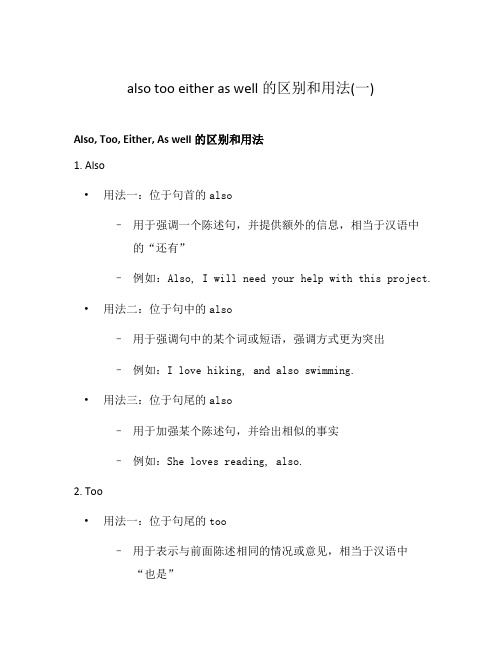
also too either as well的区别和用法(一)Also, Too, Either, As well的区别和用法1. Also•用法一:位于句首的also–用于强调一个陈述句,并提供额外的信息,相当于汉语中的“还有”–例如:Also, I will need your help with this project. •用法二:位于句中的also–用于强调句中的某个词或短语,强调方式更为突出–例如:I love hiking, and also swimming.•用法三:位于句尾的also–用于加强某个陈述句,并给出相似的事实–例如:She loves reading, also.2. Too•用法一:位于句尾的too–用于表示与前面陈述相同的情况或意见,相当于汉语中“也是”–例如:I am tired, too.•用法二:位于句中的too–用于强调句中某人或某物和其他人或物一样–例如:He, too, has a dog.3. Either•用法一:位于句尾的either–用于在否定句中表示两种选择中的任何一种–例如:I don’t like tea, either.•用法二:either…or…–用于表示两种选择之间的关系,相当于汉语中的“要么…要么…”–例如:You can either study or play games.4. As well•用法一:位于句尾的as well–用于表示除了前面提到的情况之外,还有另外一项–例如:I like cooking and gardening as well.•用法二:as well as–用于列举一系列事物时,表示“还有…以及…”–例如:He is good at playing soccer as well asbasketball.以上是also, too, either, as well的常见用法及区别。
通过合理运用这些词语,可以使你的表达更加准确明确。
too和either的区别
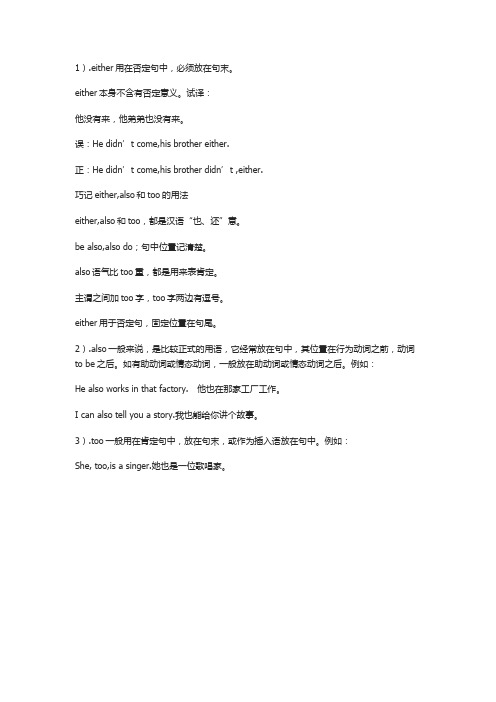
1).either用在否定句中,必须放在句末。
either本身不含有否定意义。
试译:
他没有来,他弟弟也没有来。
误:He didn’t come,his brother either.
正:He didn’t come,his brother didn’t ,either.
巧记either,also和too的用法
either,also和too,都是汉语“也、还”意。
be also,also do;句中位置记清楚。
also语气比too重,都是用来表肯定。
主谓之间加too字,too字两边有逗号。
either用于否定句,固定位置在句尾。
2).also一般来说,是比较正式的用语,它经常放在句中,其位置在行为动词之前,动词to be之后。
如有助动词或情态动词,一般放在助动词或情态动词之后。
例如:
He also works in that factory. 他也在那家工厂工作。
I can also tell you a story.我也能给你讲个故事。
3).too一般用在肯定句中,放在句末,或作为插入语放在句中。
例如:
She, too,is a singer.她也是一位歌唱家。
also,as well,too,either

also,as well,too,either
1. also: 用于肯定句,放在句中,位于系动词或助动词之后,谓语动词之前。
如:
John also plays the piano.约翰也弹钢琴。
His wife went abroad last year and he will also go abroad.他妻子去年出国,他也要出国。
2. as well用于肯定句,一般放在句末。
如:
He speaks French,and English as well.他既能说法语,也能说英语。
I am going to London and my sister is going as well(=going,too).
我要到伦敦去,我妹妹也要去。
3. too用于肯定句中,一般放在句末。
和as well一样。
如:
—I want to eat an apple.我想吃个苹果。
—Me too.我也想吃。
4. either用于否定句中,一般放在句末,肯定句变否定句时,其中的also和too等要改成either.如:
I don't watch TV,either.我也没看电视。
He won't go,either.他也不会去。
also, too, either, as well的区别

also, too, either, as well的区别这四个副词均可表示“也”,区别如下:1.too 和as well 多用于口语中,语气较轻,通常用于肯定句或疑问句,一般不用于否定句,且通常放在句末。
如:I like you too [as well]. 我也喜欢你。
Are they coming too [as well]? 他们也来吗?too 有时也紧跟在主语后(注:as well 不这样用),此用法较正式。
如:I, too, know where he lives. 我也知道他住在什么地方。
在Me too, You too 这类简略答语中,通常不用as well, also。
如:A:I’m tired. 我累了。
B:Me too. 我也是。
as well意为“也,又,而且”,意思等同于too,also,但as well只能置于句末。
He speaks English and Spanish as well.他既能说英语, 也能说西班牙语。
There may be travel expense, as well.可能还有旅途费用。
Are they coming as well?他们也来吗?as well也, 还有He speaks English and Spanish as well.他既能说英语, 也能说西班牙语。
2.also 比too 和as well 正式,一般也不用于否定句,它在句中的位置通常是紧靠动词,即放在行为动词之前,特殊动词之后。
有时为了强调也放在句末(但不常见)。
如:He also came. / He came also. 他也来了。
She is young and beautiful,and also rich. 她年轻漂亮,而且有钱。
also 有时用于句首(其后通常有逗号),相当于连词and。
如:Also,his mother was dead. 再说,他母亲又过世了。
still also too yet either的区别

"Still"、"also"、"too"、"yet"和"either"都是表示程度、范围、时间、条件等方面的副词,但它们的用法和意义有所不同。
1. "Still"表示持续的状态或程度,通常用于强调某种情况或状态的持续性,如:- She's still working on the project.(她仍在继续这个项目。
)- He's still not feeling well.(他仍然感觉不舒服。
)2. "Also"表示与前面的内容有关,但不是唯一的,通常用于列举或补充前面的内容,如:- I like swimming, also hiking and biking.(我喜欢游泳,也喜欢徒步旅行和骑自行车。
)- She's also a talented singer.(她也是一位有才华的歌手。
)3. "Too"表示某种情况或状态也适用于前面的人或物,通常用于加强前面的陈述,如:- I'm too tired to go out tonight.(我太累了,今晚不能出去了。
)- She's too busy to come to the party.(她太忙了,无法来参加聚会。
)4. "Yet"表示某种情况或状态还没有发生,通常用于否定句中,表示某种期待或希望,如:- I haven't seen him yet, but I'm sure he'll come.(我还没见到他,但我相信他会来的。
)- She's been studying hard, yet she still hasn't passed the test.(她一直在努力学习,但还没有通过考试。
also,too,either的使用区别

also, too, either, as well的区别1、too 与as well 多用于口语中,语气较轻,通常用于肯定句或疑问句,一般不用于否定句,且通常放在句末。
如:I like you too [as well]、我也喜欢您。
Are they coming too [as well]? 她们也来不?too 有时也紧跟在主语后(注:as well 不这样用),此用法较正式。
如:I, too, know where he lives、我也知道她住在什么地方。
在Me too, You too 这类简略答语中,通常不用as well, also。
如:A:I’m tired、我累了。
B:Me too、我也就是。
2、also 比too 与as well 正式,一般也不用于否定句,它在句中的位置通常就是紧靠动词,即放在行为动词之前,特殊动词之后。
有时为了强调也放在句末(但不常见)。
如:He also came、/ He came also、她也来了。
She is young and beautiful,and also rich、她年轻漂亮,而且有钱。
also 有时用于句首(其后通常有逗号),相当于连词and。
如:Also,his mother was dead、再说,她母亲又过世了。
3、either(也)通常只用于否定句,且要放在句末。
如:I don’t know, either、我也不知道。
He hasn’t finished it,either、她也还没有做完。
注:有时在肯定句之后跟一个否定句,可能用too,also。
如:He came, but she didn’t also came、她来了,但她没有也一起来。
He went to Washington, but not to New York too、她去了华盛顿,但并不就是也去了纽约。
比较:He didn’t buy a computer, and she didn’t either、她没有买电脑,她也没有买。
me either 和 me too的区别

me either 和me too的区别
me too表达”我也是“的意思,前面的话一般是肯定语气的句型。
me either可以单独用作答句,Me either =Neither do I=Me neither,意思是我也不,me either另一种用法是不单独用作答句。
me either 和me too的区别
1me either不单独用作答句的例句
He won't be too happy to see me either.
他不会高兴见我的。
Wasn't the first time he disappointed me either.
这也不是他第一次让我失望了。
I couldn't find a woman to go with me either!
我也找不到女人陪我看这部电影诶!
2me too的相关例句
Amy: Me too. I'm just thinking about the gift. Have you got any good ideas?
艾米:我也是。
但我还在想礼物。
你有什么好主意吗?
'I've got a great feeling about it.' —'Me too.'
“我感觉这次一定没问题。
”——“我也是。
”
A: No problem. Let's make it.Catch you later. B: Catch you. A: Me too.
A:没问题,我们走吧,待会儿见。
B:待会见。
A:我也是。
too与either的区别是什么

too与either的区别是什么?
either和too都可以当"也"讲,前者用在否定句中,后者用在肯定句中.
比如Lily likes fruit. I like fruit, too. 莉莉喜欢水果,我也是。
Lily doesn't like fruit. I don't like fruit,either.
1、 either表示二者之一。
We can go to either restaurant. I don't mind.我们可以去两家饭店中的任何一家。
我不再乎。
I haven't been to either of those restaurants.我没去过那两家饭店中的任何一个。
2、either 意思也是也。
它用于否定句中,而且要放在句末。
If you do not go,I shall not either.倘若你不去,我也不去。
3、too 表示“太”,有超出极限无法忍受之意。
It's too hot in the room. I can't stay here.房间太热了。
我简直呆不下去了。
4、too表示??也??还??而且,常表示与某人做同样的事,也常用于非正式语体或口语中。
too通常放在句末或单词、词组之后,其语气较轻。
在句子中,too用作插入语时,前后应用逗号隔开,此时too与also可以替换。
too放在句末,表示强调谓语或宾语,当too放在形容词、副词之前,其含义表示??太??过于,too的用法比also更多些。
英语语法解析Also , Either , Too , As well的用法及区别
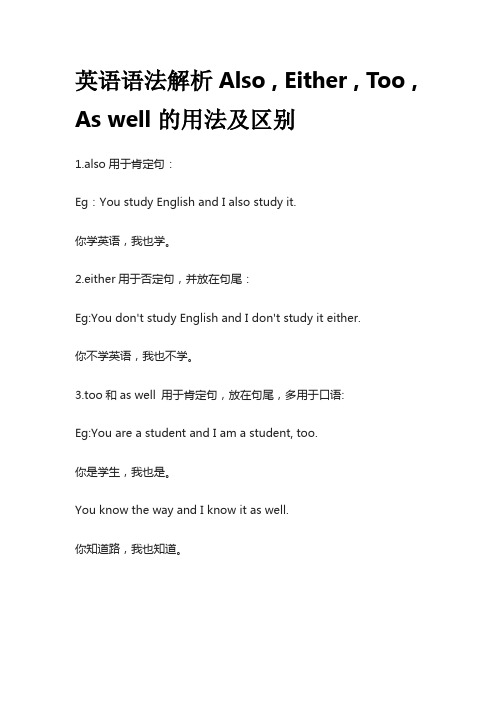
英语语法解析Also , Either , Too , As well的用法及区别1.also用于肯定句:Eg:You study English and I also study it.你学英语,我也学。
2.either用于否定句,并放在句尾:Eg:You don't study English and I don't study it either.你不学英语,我也不学。
3.too和as well 用于肯定句,放在句尾,多用于口语:Eg:You are a student and I am a student, too.你是学生,我也是。
You know the way and I know it as well.你知道路,我也知道。
#二.too和as well在口语中的使用频率要大于also,在also , too 和as well三者之中,also是比较正式的,书面语中比较多见。
而too和as well比较口语化一些。
否定句的时候,我们一般会使用either 放在句尾表示“也”,而不是使用too和also 。
Eg :1.Can you come too/as well?你也能来吗?2.I was soo busy I missed lunch and dinner as well.我太忙了以至于我忘记了吃午饭也忘记了吃晚饭。
3.I don't like grammar.我不喜欢语法。
4.I don't like it either.我也不喜欢。
#三.Also的用法1.also 比too 和as well 正式,一般也不用于否定句:Eg:She is young and beautiful, and also rich.她年轻漂亮,而且有钱.2.also 有时用于句首(其后通常有逗号),相当于连词and:Eg:Also, his mother was dead.再说,他母亲又过世了.3.我们经常把also 前置,来强调后面的观点:Eg:It’s very humid. Also, you can easily get sunburn.非常潮湿。
either和too和also和so的区别

either,too,also,so这四个词都是副词,都含有 也的意思,可是它们的具体含义和用法却有比较明显的区别。
只能用在否定句中,常常和否定词not连用,用来否定词组或句子,其含义表示 也不 ,在一般情况下只能放在句末来加强整个句子的语气。
例如: She isn t likely to agree,either.她也不会同意的。
won t be in and won t (be) either.格林先生不在,史密斯先生也不在.表示 也 还 而且 ,常表示与某人做同样的事,也常用于非正式语体或口语中。
too通常放在句末或单词、词组之后,其语气较轻。
在句子中,too用作插入语时,前后应用逗号隔开,此时too与also可以替换。
too放在句末,表示强调谓语或宾语,当too放在形容词、副词之前,其含义表示 太 过于 ,too的用法比also更多些。
如: He can sing and dance, too.他会唱歌,也会跳舞。
That skirt is abit too short forher daughter.那条裙子对她女儿而言是太短了点儿。
You,too,may have a try.你也可以试一试。
Too the children will find in the book a lot of interesting pictures. 孩子们还能在书里面看到许多有趣的图片。
They also work in the hospital.=They work in the hospital,too.他们也在医院工作.3.在书面语里,also比too较为正式,also的语气较强,它的含义是 而且......还表示 此外还 也等含义,有时 also也表示 同样地的含义。
在口语中,also可以和too替换使用,但是,要注意also和too在句子中的位置不同。
also和常用的副词在句子中的位置相同,一般放在实意动词之前或系动词之后,有时放在整个谓语动词之前,有时也放在句首或句末用来修饰整个句子。
also too either as well的区别和用法

also too either as well的区别和用法摘要:1.介绍also, too, either 和as well 的含义和用法2.区分also, too, either 和as well 之间的差异3.提供实例说明这些词的用法4.总结这些词的用法和注意事项正文:一、also, too, either 和as well 的含义和用法1.also:用于肯定句中,表示“也”,“同样”2.too:用于肯定句中,表示“也”,“同样”3.either:用于否定句和疑问句中,表示“也不”,“任何一个”4.as well:用于肯定句和否定句中,表示“也”,“同样”二、区分also, too, either 和as well 之间的差异1.also 和too 的用法相似,都表示“也”,“同样”,但是also 用于较为正式的场合,而too 更常用于口语中。
2.either 用于否定句和疑问句中,表示“也不”,“任何一个”,而also 和too 只能用于肯定句中。
3.as well 用于肯定句和否定句中,表示“也”,“同样”,与also 和too 的用法类似,但是as well 可以放在句首、句中和句末。
三、实例说明这些词的用法1.also 的用法:I like apples and oranges.I also like bananas.(我也喜欢香蕉。
)2.too 的用法:She likes apples and oranges.She also likes bananas.(她也喜欢香蕉。
)3.either 的用法:I don"t like apples.I don"t like oranges either.(我也不喜欢橙子。
)4.as well 的用法:I like apples, oranges, and bananas as well.(我也喜欢香蕉。
)四、总结这些词的用法和注意事项1.also, too 和as well 的用法相似,都表示“也”,“同样”,但是它们在不同语境下的使用频率和场合有所不同。
aswell,either,also,too的区别

aswell,either,also,too的区别aswell,either,also,too的区别编辑整理:尊敬的读者朋友们:这里是精品文档编辑中心,本文档内容是由我和我的同事精心编辑整理后发布的,发布之前我们对文中内容进行仔细校对,但是难免会有疏漏的地方,但是任然希望(aswell,either,also,too的区别)的内容能够给您的工作和学习带来便利。
同时也真诚的希望收到您的建议和反馈,这将是我们进步的源泉,前进的动力。
本文可编辑可修改,如果觉得对您有帮助请收藏以便随时查阅,最后祝您生活愉快业绩进步,以下为aswell,either,also,too的区别的全部内容。
aswell,either,also,too的区别as well, either, also, too的区别1。
also用于肯定句,既可表示两人干了同样的事,也可表示一个人干了两件事,通常位于be动词,助动词或情态动词之后,行为动词之前。
如:He has been to Beijing. I have also been there.他去过北京,我也去过.He is good at English. He is also good at Japanese.他擅长英语,也擅长日语.I also wants some tea.我也要点茶。
注意:表示强调时,also也可放在助动词或情态动词等之前。
比较:I can also do it.我也能干。
I also can do it.(同上)2.too也用于肯定句,比also更通俗,和also, as well可以相互替换,可放在句中,也可放在句末。
如:Xiao Li went to Beijing and Xiao Zhao, too, went to Beijing。
小李到北京去了,小赵也到北京去了。
He studies hard and I study hard, too.他学习用功,我(学习)也用功。
too
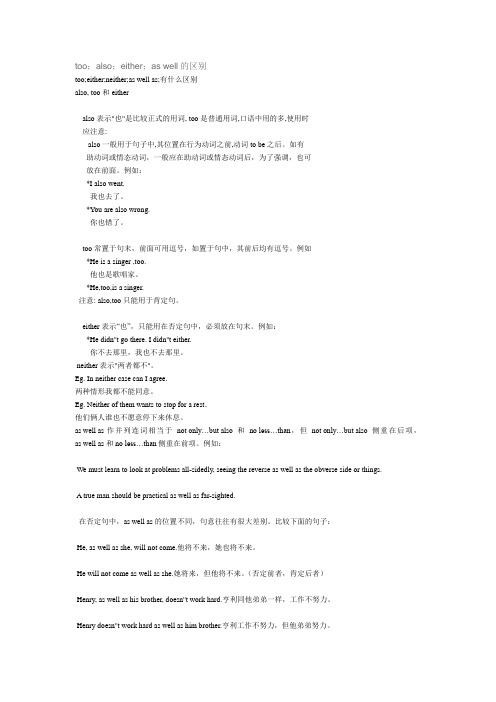
too;also;either;as well的区别too;either;neither;as well as;有什么区别also, too 和 eitheralso表示"也"是比较正式的用词, too 是普通用词,口语中用的多,使用时应注意:also 一般用于句子中,其位置在行为动词之前,动词to be之后。
如有助动词或情态动词,一般应在助动词或情态动词后,为了强调,也可放在前面。
例如:*I also went.我也去了。
*You are also wrong.你也错了。
too常置于句末,前面可用逗号,如置于句中,其前后均有逗号。
例如*He is a singer ,too.他也是歌唱家。
*He,too,is a singer.注意: also,too只能用于肯定句。
either 表示“也”,只能用在否定句中,必须放在句末。
例如:*He didn''t go there. I didn''t either.你不去那里,我也不去那里。
neither表示"两者都不"。
Eg. In neither case can I agree.两种情形我都不能同意。
Eg. Neither of them wants to stop for a rest.他们俩人谁也不愿意停下来休息。
as well as 作并列连词相当于not only…but also和no less…than,但not only…but also侧重在后项,as well as 和no less…than侧重在前项。
例如:We must learn to look at problems all-sidedly, seeing the reverse as well as the obverse side or things.A true man should be practical as well as far-sighted.在否定句中,as well as 的位置不同,句意往往有很大差别。
also too either的用法区别

also too either的用法区别
also too either的用法区别:
1.also 通常用于肯定句中,其位置一般在行为动词之前,特殊动词之后,或者紧邻行为动词。
当用作并列连词时,它可以连接两个相同意义的词语,表达“也”的含义。
例如:"He is a teacher, and also an engineer."(他既是老师又是工程师。
)
2.too 一般用于肯定句中,也可以用于否定句,但其位置相对灵活,可以放在句末,也可以插入句中,前后通常会用逗号分隔。
在肯定句中使用时,"too" 可以用来加强语气,表明数量过多或程度过高。
例如:"The cake was delicious, and she ate too much of it."(蛋糕很好吃,她吃得太多了。
)
3.either 主要用于否定句中,表示除了某人或某事之外的其他选择。
它的位置通常在句末,有时也会放在句首,这时其后通常会有逗号。
例如:"Neither do I know the answer, nor does he."(我也不知答案,他也不知。
)
综上所述,also 更适合用于肯定句中以突出并列项,而too 既可以用于肯定句中以强化语气,也可以在否定句中表示排除其他选项。
either 则主要用于否定句中,用以排除两种可能性中的任意一种。
在使用时,应根据句子的类型和语境来选择合适的词汇。
as well,either,also,too的区别教学文案
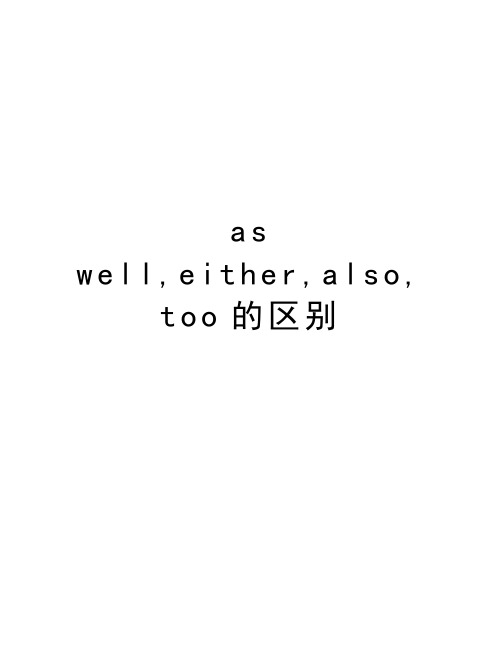
a sw e l l,e i t h e r,a l s o, t o o的区别精品资料as well, either, also, too的区别1.also用于肯定句,既可表示两人干了同样的事,也可表示一个人干了两件事,通常位于be动词,助动词或情态动词之后,行为动词之前。
如:He has been to Beijing. I have also been there.他去过北京,我也去过。
He is good at English. He is also good at Japanese.他擅长英语,也擅长日语。
I also wants some tea.我也要点茶。
注意:表示强调时,also也可放在助动词或情态动词等之前。
比较:I can also do it.我也能干。
I also can do it.(同上)2.too也用于肯定句,比also更通俗,和also, as well可以相互替换,可放在句中,也可放在句末。
如:Xiao Li went to Beijing and Xiao Zhao, too, went to Beijing.小李到北京去了,小赵也到北京去了。
He studies hard and I study hard, too.他学习用功,我(学习)也用功。
3.either用于否定句,而且只能放在句末。
如:He didn’t know it.I didn’t know it either.他不知道那件事,我也不知道。
I can’t speak French and can’t write it, either.我不会讲法语,也不会写法语。
4.as well在口语中用得很多,用法和too完全一样,可以互换,通常位于句末。
[见as well, as well as条]。
如:She not only sings,she plays the piano as well.她不但会唱歌,而且会弹钢琴。
either和or和also和too区别造句子
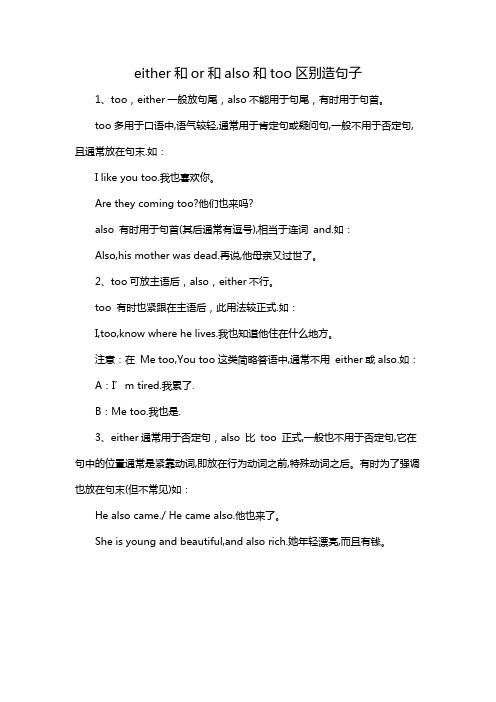
either和or和also和too区别造句子
1、too,either一般放句尾,also不能用于句尾,有时用于句首。
too多用于口语中,语气较轻,通常用于肯定句或疑问句,一般不用于否定句,且通常放在句末.如:
I like you too.我也喜欢你。
Are they coming too?他们也来吗?
also 有时用于句首(其后通常有逗号),相当于连词and.如:
Also,his mother was dead.再说,他母亲又过世了。
2、too可放主语后,also,either不行。
too 有时也紧跟在主语后,此用法较正式.如:
I,too,know where he lives.我也知道他住在什么地方。
注意:在Me too,You too这类简略答语中,通常不用either或also.如:A:I’m tired.我累了.
B:Me too.我也是.
3、either通常用于否定句,also 比too 正式,一般也不用于否定句,它在句中的位置通常是紧靠动词,即放在行为动词之前,特殊动词之后。
有时为了强调也放在句末(但不常见)如:
He also came./ He came also.他也来了。
She is young and beautiful,and also rich.她年轻漂亮,而且有钱。
